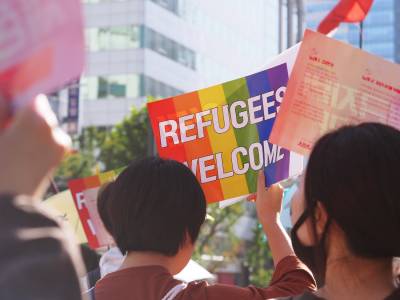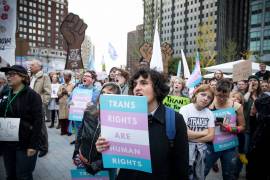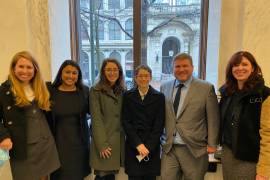
The Hope and Incompleteness of Pride: LGBTQ Refugees are Repeatedly Denied the Right to the Complexity of their Identities and Lives
Blog Search
By Nora Huppert and Jennifer C. Pizer
There is a great deal to celebrate this Pride month. June 15th marked the one-year anniversary of the landmark Bostock decision at the Supreme Court, which confirmed what had been obvious for years: that longstanding federal civil rights laws against sex discrimination protect queer and trans employees, too. The transition from the Trump administration to the Biden administration has brought with it a bevy of new policies that protect LGBTQ Americans, and the demise of even more discriminatory policies from the last four years. And the same as every year, a new generation of queer and trans people come to know themselves and celebrate their identities publicly, whether the result of a realization long delayed by discrimination, or simply another chapter in a rich coming-of-age story.
But amidst the wonder and joy and the celebration of identity that Pride can symbolize, we must remember the many LGBTQ people who are not reflected or represented in the concept of Pride, and who still face life-threatening discrimination by a government that promotes values of equality and publicly celebrates Pride. Many LGBTQ Americans can probably recount some version of a story about their first Pride — joining in a celebration from which they felt sidelined or that they felt unable to embrace for years. As the stories below demonstrate, LGBTQ immigrants seeking asylum and other forms of immigration relief in the U.S. navigate the same fraught dilemmas of identity and community while also facing active discrimination by the Department of Homeland Security, an arm of the federal government that fails countless LGBTQ refugees seeking asylum, yet simultaneously celebrates Pride on its twitter account.
The U.S. is decidedly not a utopia of LGBTQ equality. This year, we’ve seen a toxic wave of anti-trans legislation sweep across state legislatures around this country. Also, this month, in a unanimous, yet narrow, ruling, the Supreme Court ruled in favor of a religiously affiliated foster care agency, finding that the City of Philadelphia demonstrated anti-religious bias against Catholic Social Services when it objected to the agency’s refusal to place children in need of care with same-sex parents. And the United States, as a government and society, has yet to meaningfully address violence against trans women of color. Despite all of this, many queer and trans immigrants still see this country as their best chance at some semblance of survival and safety – a glimmer of hope that too often remains out of reach due to an overburdened immigration system that lacks the competence to appreciate the complexity of queer and trans identity and therefore systematically discriminates against LGBTQ asylum seekers.
It is for this very reason that Lambda Legal filed friend-of-the-court briefs in three separate appeals involving denials of asylum and other immigration relief to three LGBTQ refugees. Their stories are a somber reminder of the hope and incompleteness of Pride, and of a country that offers equality but on an unequal basis. The common thread is an asylum system without the basic essential knowledge about gender identity and sexual orientation, and which dismisses the very real threat of violence and persecution.
For Alicia*, a trans woman from Mexico, that lack of basic knowledge meant that when she sought protection from those who had singled her out and coerced her into working for them, her pleas were not only ignored by the local police but then rejected by the U.S. asylum system. Alicia faced violence from cartel members, who targeted her because she is transgender and attempted to coerce her into working for them. When she refused, she was kidnapped, brutally attacked, and left on the side of the road. She attempted to obtain police assistance, but the police did not help her; instead, they harassed her, too. The Immigration Judge decided that the persecution and violence that Alicia faced was not sufficiently connected to her identity as trans and held that she had received adequate police attention because the police listened to her pleas, even if they did nothing to assist her.
Michael* faced persistent harassment and violent physical assault as a young boy perceived as effeminate in Jamaica. Then, when he sought protection as a refugee after coming out as bisexual, he faced an unexpected obstacle: our U.S. asylum system ignored the evidence of the entrenched, extreme persecution throughout Jamaica of people perceived to be LGBTQ. Lambda Legal filed our amicus brief with detailed evidence confirming the inescapably dangerous conditions Michael would face were he to be returned to Jamaica, highlighting the legal error of our government’s dismissal of the high-quality evidence submitted in support of his petition to remain in the U.S.
And for Gloria*, also a trans woman from Mexico, that lack of understanding of our lives meant that her application was denied on the ground that her transition did not qualify as a “changed circumstance” within the meaning of U.S. asylum law. This bewildering view represents a profound misunderstanding of the reality of what it means to be transgender, and a complete lack of appreciation for the significance of transition in one’s own life, and to one’s stability and safety, particularly for trans women.
In Gloria’s case, the asylum system proved incapable or unwilling to comprehend concepts that trans people navigate every day, like the subtle but potentially monumental distinction between “coming out” and transition. The process of learning and accepting one’s identity — a process that we celebrate during Pride — was not legible to the people tasked with assessing her claim to protection from harm; put simply, the U.S. asylum system did not see her, and failed her.
These three applications should have been approved, which is why Lambda Legal filed amicus briefs in each appeal. Even as we celebrate monumental gains, many of them now reinstated or newly initiated by the Biden administration, we must also hold the U.S. immigration system to account for its failures to protect queer and trans asylum seekers in the ways promised by our nation’s immigration laws and treaty commitments.
A lack of LGBTQ competency in the asylum system is dangerous – as these three stories illustrate, because when it wrongly denies crucial protection to LGBTQ people seeking safety from persecution because of who they are, it often returns them to the likelihood of deadly harm. The Biden administration has made welcome grand pronouncements about its commitment to LGBTQ equality, and in many matters domestic, it has followed through. But there cannot be an exception to the general rule that LGBTQ people deserve protection from harm specifically for those from other countries seeking the refuge that our laws and traditions promise. The Biden administration should address the serious obstacles that LGBTQ asylum seekers face arising principally from a failure to understand our lives and our journeys. This administration cannot whole-heartedly pledge to fight for LGBTQ people and to champion universal human rights, yet tell those abroad who are seeking safety and the freedom to be their true and complex selves, “do not come.”
*The names of the three people in this story have been changed to protect their identities.




